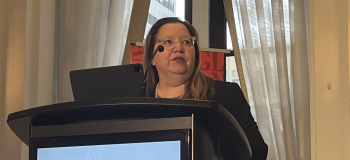Image Caption
Local Journalism Initiative Reporter
Windspeaker.com
First Nations across the country are doing their bit to advance clean energy.
That was a message that was given by Assembly of First Nations (AFN) National Chief Cindy Woodhouse Nepinak during a speech she delivered at the Indigenous Clean Energy (ICE) conference in Toronto.
The conference, titled The Gathering, was held Nov. 27-29.
Woodhouse Nepinak, who spoke on Nov. 28, said First Nations are involved in more than 200 significant clean energy projects across Canada.
She also said there’s a need for every First Nation to get off diesel. Many of them are still reliant on diesel because of the lack to clean energy.
“We have to help connect those communities if they so wish,” Woodhouse Nepinak said. “And we have to take their lead.”
The AFN had declared a climate emergency at its 2019 annual general assembly staged in Fredericton, N.B.
“This also led to an endorsement of AFN’s national climate strategy in 2023,” Woodhouse Nepinak said. “A key priority of the AFN national climate strategy is to ensure the First Nations self-sufficiency in food, water and energy on our own lands.
“It should come as no surprise to those of us that are gathered here today that First Nations are leading the way with new approaches and innovations in clean energy, continuing to grow our participation in the clean energy landscape.”
Woodhouse Nepinak provided additional information on AFN’s national climate strategy. She said it “envisions a future that is led by First Nations with energy sovereignty as a cornerstone of self-determined climate action - action that supports First Nations to create good jobs and generate own-source revenue.”
The strategy also includes other details on how to achieve progress.
“The climate strategy also identifies specific actions to help drive this vision forward, including the development of a focused First Nations energy strategy and restoring the ability of First Nations to earn revenue by selling the electricity generated, as well as other initiatives to enable economic opportunities related to clean energy production,” Woodhouse Nepinak said.
She also said First Nations play a vital not only in driving climate action in Canada and ensuring the success of Canada’s clean energy future.
“But First Nations must be at the table, not just on the menu, in all discussions that we have,” she said. “This includes project-level involvement and the recognition of First Nations as governments with full and active roles.”
During her speech, Woodhouse Nepinak took some time to praise the late Murray Sinclair, who died on Nov. 4.
Sinclair, who had served as a senator, was also the chair of the Truth and Reconciliation Commission of Canada. And he was a longtime advocate of Indigenous issues.
Woodhouse Nepinak requested a moment of silence in Sinclair’s honour during her speech. She said he often brought people together and would say ‘Here’s a roadmap, let’s follow that.’.
“And so, we’re here today to talk about some of these issues,” Woodhouse Nepinak added.
She then jumped into the topic of recent wildfires.
“These past two summers have marked the worst fire season on record,” she said. “This past summer in Jasper, Treaty 6 territory, we had witnessed a wildfire that ripped through this historic national park leaving so many people in a crisis. A crisis that is likely never to be fully overcome.”
Woodhouse Nepinak said the damage from such events should not only be calculated in dollars.
“The social costs can be even more devastating and can leave scars that never fully heal,” she said. “When these events occur, whether it’s fires, floods, winter storms, windstorms, tornados or extreme heat, people are often forced to flee. And when these disasters happen year after year, many people choose to leave and never return.”
Woodhouse Nepinak said First Nations people are different because they’re always rooted in their place.
“We have survived millennia, not because we have moved from place to place,” she said. “But because of how deep we are tied to the lands, to our territories and to Mother Earth.
“We know our lands intimately with names for every distinct feature. We know the plants and the animals that inhabit our lands. And we have the knowledge passed down through generations over the centuries, since the beginning of time.”
Despite the resiliency of First Nations people, Woodhouse Nepinak said actions need to be taken to deal with climate change.
“When disaster strikes, yes we protect our families,” she said. “But we always return because this land, our land, is our mother.
But without urgent and transformative action, the severity of these disasters will only continue to grow. And the consequences will become more severe.”

